(新)高中英语Module4GreatScientistsSectionⅢGrammar-复习被动语态和by+v教学案外研版必修4
高中英语Module4GreatScientists单元小结教学案外研版必修4(new)

Module 4 Great ScientistsWhich are you interested in,botany,biology, biochemistry, zoology, genetics orcosmology? There are brilliant scientists inevery field。
Today, I’ll introduce one of them to you.Dr Yuan Longping is a leading figure in China’s agricultura l research. Dr Yuan is known for his super hybrid rice and has been awarded several times. Born, brought up and educated in China, Dr Yuan knew that many people suffered from hunger。
A lot of them even earn their living by begging. At that time rice was a staple food in China. So he dreamed of developing a new species to raise rice production to feed more people. After graduating, supported by the government, he devoted himself to the research. As a result of his years’ efforts, in 1970,he made a great breakthrough and finally developed hybrid. This hybrid rice has a higher yiel d than either of the original plants. His discovery was published in newspapers worldwide. Now,Dr Yuan’s rice has gradually replaced the common rice and much of the land has been converted to growing vegetables and cash crops. Large quantities of rice have been exported to other countries,which partly solve the world hunger。
高中英语Module4GreatScientists话题写作表达升级课件外研版必
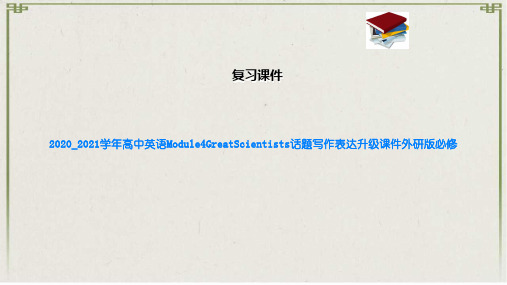
③He is devoted to medicine and education. 他献身于医学教育事业。
2020_2021学年高中英语 Module4GreatScientists话题写作表达升级 课件外研版必修
•同学们,下课休息十分钟。现在是休息时间,你们休 息一下眼睛,
•看看远处,要保护好眼睛哦~站起来动一动,久坐对身 体不好哦~
【谋篇立意】
【遣词造句】 1. 完成句子 (1)钟南山是一位著名的医学科学家。 Zhong Nanshan is _a_f_a_m__o_u_s_m__e_d_ic_a_l_s_c_iБайду номын сангаас_n_t_i_st_. (2)他在1936年出生于南京。 He _w_a_s__b_o_r_n_i_n_1936 in Nanjing. (3)他带领医护人员抗击新冠肺炎。 He led the medical workers to _fi_g_h_t_a_g_a_i_n_s_tCOVID-19.
【话题拓展】 1. 话题词汇 ①hard-working ②active ③be devoted to. . . ④be fond of. . . ⑤at the age of. . . ⑥be born in. . . ⑦graduate from. . .
工作努力的 积极的 专心投入……; 献身于…… 喜欢…… 在……年龄时 出生于…… 毕业于……
⑧have a gift for. . . ⑨get a. . . degree in. . . ⑩speak highly of ⑪be regarded as. . . ⑫be respected by. . .
有……天赋 在……获得……学位 高度评价 被视为…… 被……尊敬
高中英语《Module4Greatscientists》课中学案外研必修4
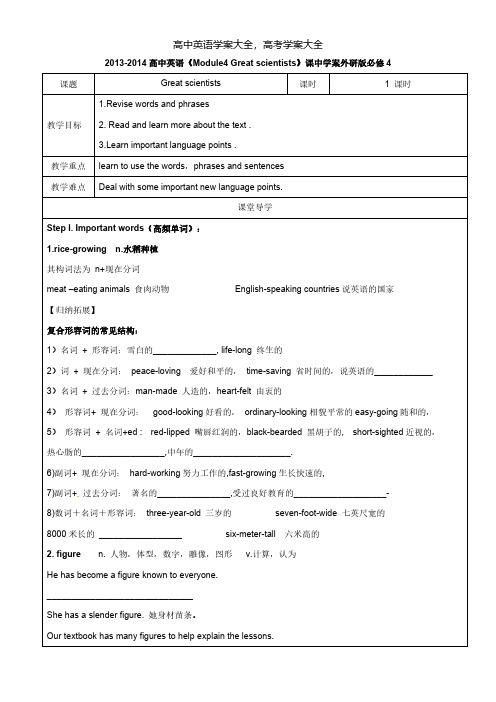
2013-2014高中英语《Module4 Great scientists》课中学案外研版必修4课题Great scientists课时 1 课时教学目标1.Revise words and phrases2. Read and learn more about the text .3.Learn important language points .教学重点learn to use the words,phrases and sentences教学难点Deal with some important new language points.课堂导学Step I. Important words(高频单词):1.rice-growing n.水稻种植其构词法为n+现在分词meat –eating animals 食肉动物English-speaking countries说英语的国家【归纳拓展】复合形容词的常见结构:1)名词+ 形容词:雪白的_____________, life-long 终生的2)词+ 现在分词:peace-loving 爱好和平的,time-saving 省时间的,说英语的____________ 3)名词+ 过去分词:man-made 人造的,heart-felt 由衷的4)形容词+ 现在分词:good-looking好看的,ordinary-looking相貌平常的easy-going随和的,5)形容词+ 名词+ed : red-lipped 嘴唇红润的,black-bearded 黑胡子的, short-sighted近视的,热心肠的_________________,中年的____________________.6)副词+ 现在分词:hard-working努力工作的,fast-growing生长快速的,7)副词+过去分词:著名的_______________,受过良好教育的___________________-8)数词+名词+形容词:three-year-old 三岁的seven-foot-wide 七英尺宽的8000米长的_________________ six-meter-tall 六米高的2. figure n. 人物,体型,数字,雕像,图形v.计算,认为He has become a figure known to everyone.______________________________She has a slender figure. 她身材苗条。
高三英语复习 Module 4 Great Scientists语言知识案 外研版必修4(2021
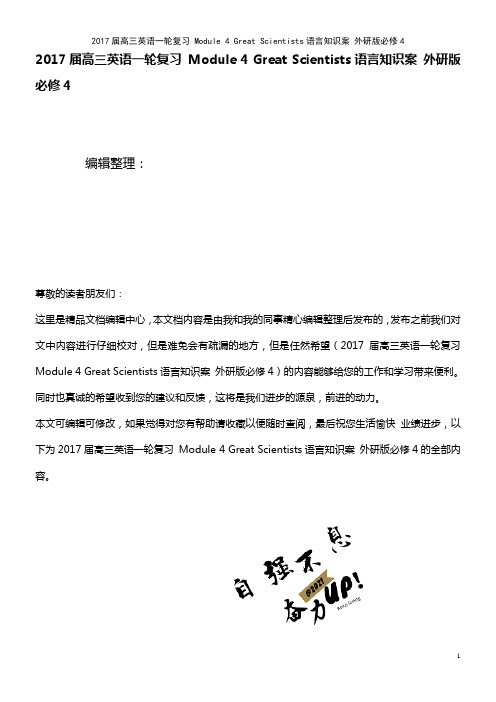
2017届高三英语一轮复习Module 4 Great Scientists语言知识案外研版必修4编辑整理:尊敬的读者朋友们:这里是精品文档编辑中心,本文档内容是由我和我的同事精心编辑整理后发布的,发布之前我们对文中内容进行仔细校对,但是难免会有疏漏的地方,但是任然希望(2017届高三英语一轮复习Module 4 Great Scientists语言知识案外研版必修4)的内容能够给您的工作和学习带来便利。
同时也真诚的希望收到您的建议和反馈,这将是我们进步的源泉,前进的动力。
本文可编辑可修改,如果觉得对您有帮助请收藏以便随时查阅,最后祝您生活愉快业绩进步,以下为2017届高三英语一轮复习Module 4 Great Scientists语言知识案外研版必修4的全部内容。
Module 4 Great Scientists语言知识案I.单词巩固及词形变化1.主要的 adj。
___________ 2。
支持 vt.&n. ___________3。
质量 n。
___________ 4。
受害者n. ___________ 5.聪颖的adj. ___________ 6.生涯;经历n.___________7.部分地adj。
___________ 8.教育vt___________→n。
___________教育工作者_________9。
农业 n。
___________→adj。
___________10.原来的,最初的adj. ___________→n.来源,起源 ___________11.出版vt. ___________→n。
出版商___________→n。
出版(业)___________12.出口vt.. ___________→进口vt。
___________13.个人的adj. ___________→adv。
___________→n。
个性___________14.产量n。
高中英语必修4Module 4 Great Scientists--Reading 教案

Module 4 Great ScientistsPart One Teaching DesignPeriod 1 Reading—The Student Who Asked Questions■Goals●To learn to read passages with the passive voice and by+-ing about great scientists●To learn to read with strategies■ProceduresStep 1: Warming up by defining sciencesBiochemistry: A branch of chemistry studying the chemical behavior in living beings. Biochemistry is not only interested in the individual chemical components but also their vital interplay.Biology: the science that deals with living things. It is broadly divided into zoology, the study of animal life, and botany, the study of plant life. Subdivisions of each of these sciences include cytology (the study of cells), histology (the study of tissues), anatomy or morphology, physiology, and embryology (the study of the embryonic development of an individual animal or plant). Also included in biological studies are the sciences of genetics, evolution, paleontology, and taxonomy or systematic, the study of classification.Botany: the scientific study of plant life. As a branch of biology, it is also sometimes referred to as plant science(s) or plant biology. Botany covers a wide range of scientific disciplines that study the growth, reproduction, metabolism, development, diseases, and evolution of plants.Genetics: scientific study of the mechanism of heredity. While Gregor Mendel first presented his findings on the statistical laws governing the transmission of certain traits from generation to generation in 1856, it was not until the discovery and detailed study of the chromosome and the gene in the 20th cent that scientists found the physical basis of hereditary characteristics.Zoology: The original branches of zoology established in the late 19th century such as zoo-physics, bionomics have largely been subsumed into more broad areas of biology which include studies of mechanisms common to both plants and animals. Chemistry: the science of matter and its interactions with energy and itself (see physics, biology). Because of the diversity of matter, which is mostly in the form of atoms, chemists often study how atoms interact to form molecules and how molecules(分子) interact with each other.Physics: the science of Nature in the broadest sense. Physicists study the behavior and properties of matter in a wide variety of contexts, ranging from the sub-nuclear particles from which all ordinary matter is made (particle physics) to the behavior of the material Universe as a whole (cosmology宇宙论).Step 2: Before you readPlease go over the word list for this module, paying attention to the pronunciation of the word, the relationship between its pronunciation and its spelling.Step 3: While you read1. Type of writing and summaries of The Student Who Asked QuestionsType of writing A narrationIdea of 1st para. In the rice-growing world, the Chinese scientist, Yuan Longping, is aleading figure.Idea of 2ndpara.As a boy Yuan Longping was given the nickname, “the student whoasks questions”.Idea of 3rdpara.From an early age he was interested in plants.Idea of 4th para. First Yuan Longping experimented with different types of rice.Idea of 5th para. As a result of Yuan Longping’s discoveries Chinese rice productionrose by 47.5 percent in the 1990’s.Idea of 6th para. Pakistan’ new hybrid rice has been developed by the Yuan LongpingHigh-tech Agricultural Company of China.2. A diagram of The Student Who Asked Questions3. Complete the article with one word in each blankThe Chinese scientist, Yuan Longping, is a _1_ figure in the rice-growing world. When he was educated in school he was given the _2_ , “the student who asks questions”. From an early age he was so interested in plants that he _3_agriculture in college. As a young teacher he began experimenting in crop breeding. First Yuan Longping _4_ with different types of rice. The results became known in China in 1966. Then he _5_ his search for a special type of rice plant. It had to be male. It had to be sterile. Finally, in 1970 a _6_sterile male rice plant was discovered. This was the breakthrough. As a _7 _of Yuan Longping’s discoveries Chinese rice production rose by 47.5 percen t in the 1990’s. There were other _8_, too. 50 thousand square kilometers of rice fields were converted to growing _9_and other cash crops. Following this, Yuan Longping’s rice was exported to other _10_, such as Pakistan and the Philippines.4. Answer the reading comprehension questions according to the text1. What does “staple” mean in “In a hungry world rice is a staple food and China is the world’s largest producer”?A. chief or prominent among the products exported or produced by a country or district; chiefly or largely dealt in or consumed.B. basic, chief, or principal: staple industries.C. principally used: staple subjects of conversation.D. important and outstanding2. He studied agriculture in college and as a young teacher he began experiments in _____.A. crop breedingB. feeding peopleC. sterile male riceD. with different types of rice3. He thought that the key to have more rice was by _____.A. experimenting with different types of riceB. asking questionsC. crossing different species of rice plantD. searching for a special type of rice plant4. Finally, in 1970 a _____ was discovered. This was the breakthrough.A. staple foodB. new plant which could give a higher yieldC. naturally sterile male rice plantD. leading figureStep 4: After you read1. Copy all the useful expressions into your Expression Book.2. Speaking about Yuan LongpingYou are doing to put the text into a dialogue about Yuan Longping.3. Read the text to transfer informationYou are going to read the text again and draw a diagram of it. You may use the diagram to retell the story in your own words.。
高中英语必修4Module 4 Great Scientists 练习与解析
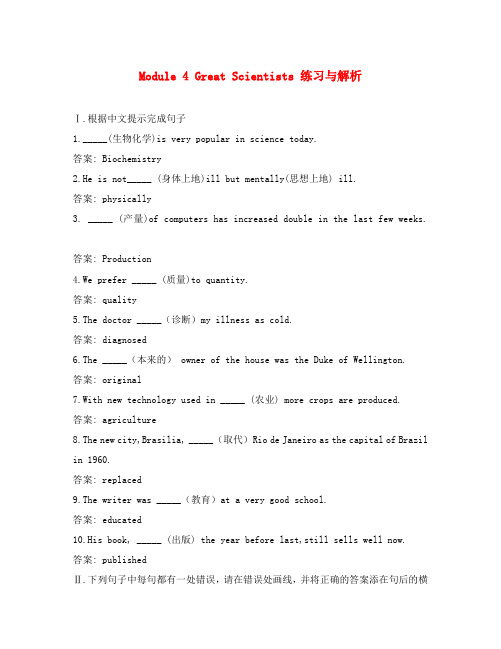
Module 4 Great Scientists 练习与解析Ⅰ.根据中文提示完成句子1._____(生物化学)is very popular in science today.答案: Biochemistry2.He is not_____ (身体上地)ill but mentally(思想上地) ill.答案: physically3. _____ (产量)of computers has increased double in the last few weeks.答案: Production4.We prefer _____ (质量)to quantity.答案: quality5.The doctor _____(诊断)my illness as cold.答案: diagnosed6.The _____(本来的) owner of the house was the Duke of Wellington.答案: original7.With new technology used in _____ (农业) more crops are produced.答案: agriculture8.The new city,Brasilia, _____(取代)Rio de Janeiro as the capital of Brazil in 1960.答案: replaced9.The writer was _____(教育)at a very good school.答案: educated10.His book, _____ (出版) the year before last,still sells well now.答案: publishedⅡ.下列句子中每句都有一处错误,请在错误处画线,并将正确的答案添在句后的横线上1.I know little about the girl calling Susan________.答案:calling→called1.the girl和call之间有被动关系,因而要用过去分词作定语。
2020高中英语 Module4 Great scientists3学案 外研版必修4
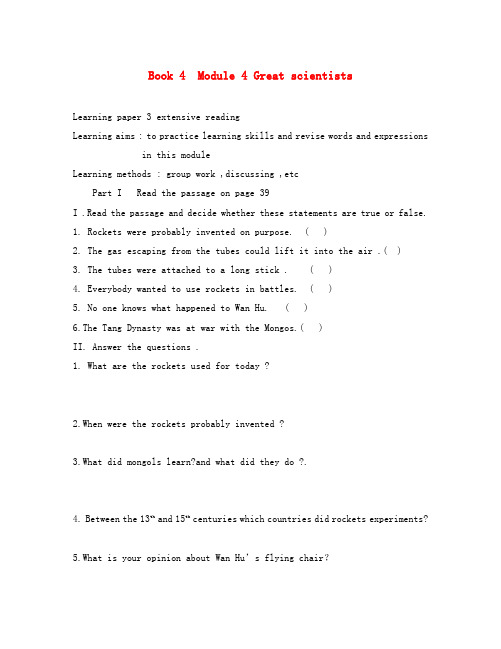
Book 4 Module 4 Great scientistsLearning paper 3 extensive readingLearning aims : to practice learning skills and revise words and expressions in this moduleLearning methods : group work ,discussing ,etcPart I Read the passage on page 39I .Read the passage and decide whether these statements are true or false.1. Rockets were probably invented on purpose. ( )2. The gas escaping from the tubes could lift it into the air .( )3. The tubes were attached to a long stick . ( )4. Everybody wanted to use rockets in battles. ( )5. No one knows what happened to Wan Hu. ( )6.The Tang Dynasty was at war with the Mongos.( )II. Answer the questions .1.What are the rockets used for today ?2.When were the rockets probably invented ?3.What did mongols learn?and what did they do ?.4. Between the 13th and 15th centuries which countries did rockets experiments?5.What is your opinion about Wan Hu’s flying chair?Part II Read the passage on page 87I . Answer the questions .1.What achievement does the World Food Prize honour?2.Who won the award in 2020?3. How can Monty Jones creat the “ New Rice for Africa”?4. Why is the hybrid particularly well suited to African rice famer?5. Why are their achievements outstanding ?II. Match the words with their definitions.1.benefit A. an important substance in food2. commercial B. ten years3. decade C. together4.jointly D.to help or give an advantage5. protein E. for sale参考译文:问问题的学生在当前的世界,水稻是主要粮食。
外研版必修四Module 4《Great scientists》ppt课件Ⅲ
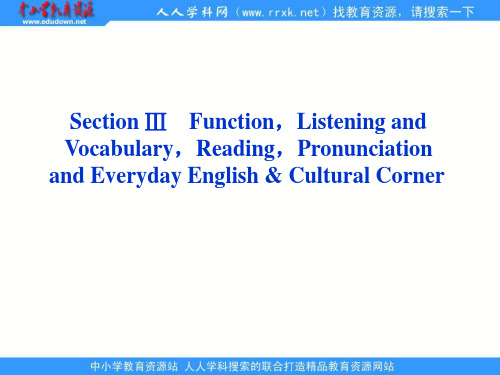
and Everyday English & Cultural Corner
SeUctnioitn Ⅲ1
重点难点探究 速效提能演练
重点难点探究
词汇精研
1. What is Einstein known for? 爱因斯坦因何而出名?
her team. 她对队里的人有很大的影响力。
牛刀小试
The project is off our hands since the new
manager ________ to power. A.brought B.took C.controlled D.came 解析:选D。句意:自从新经理上任之后,项 目就不归我们管了。come to power“掌权”, 为固定搭配。
品味经典 ①He began to earn his living at the age
of 10. 他十岁时就自己谋生。 ②He earned his living by teaching. 他以教书谋生。 自我探究 earn one’s living意为“谋生”,同义词为 make a living。earn作及物动词,意为“挣 (钱);获得”。
逃脱 逃走 九死
⑤When the guard’s back was turned,
she made her escape. 看守人一转过身去,她就逃走了。
牛刀小试
The flying bird is lucky enough to escape
________ by the hidden net the farmer
Module 4 Great Scientists
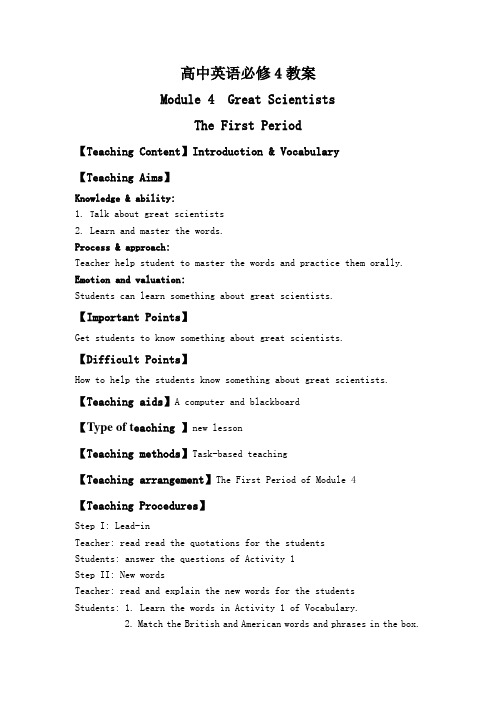
高中英语必修4教案Module 4 Great ScientistsThe First Period【Teaching Content】Introduction & Vocabulary【Teaching Aims】Knowledge & ability:1.T alk about great scientists2.Learn and master the words.Process & approach:Teacher help student to master the words and practice them orally. Emotion and valuation:Students can learn something about great scientists.【Important Points】Get students to know something about great scientists.【Difficult Points】How to help the students know something about great scientists. 【Teaching aids】A computer and blackboard【Type of t eaching 】new lesson【Teaching methods】Task-based teaching【Teaching arrangement】The First Period of Module 4【Teaching Procedures】Step I: Lead-inTeacher: read read the quotations for the studentsStudents: answer the questions of Activity 1Step II: New wordsTeacher: read and explain the new words for the studentsStudents: 1. Learn the words in Activity 1 of Vocabulary.2. Match the British and American words and phrases in the box.Step III: ReadingTeacher: give students instruction of reading.Students: Read the emails in Activity of Introduction..Step IV: PracticeTeacher: give students instruction of doing the exercise.Students: Rewrite the sentences using British words in Activity 2. 【Assignment】1. Recite the new words.2. Preview the reading text.【Rethinking after class】This lesson is to arouse the interest to the difference between British English and American English. Sthdents can memorize some commom words both in British English and American English.And they are interested in learning them.高中英语必修4教案Module 4 Great scientistsThe Second Period【Teaching Content】Reading【Teaching Aims】Knowledge & ability:Develop the students' reading ability and reading skills.Process & approach:Teacher help student to master the words and practice them.Emotion and valuation:Students Learn more about great scientists.【Important Points】1. Train the students' reading ability and develop their reading skills.2. Enable the students to understand the text better【Difficult Points】How to improve the students' reading skills.【Teaching aids】A computer and blackboard【Type of t eaching 】new lesson【Teaching methods】Task-based teaching【Teaching arrangement】The Second Period of Module 1【Teaching Procedures】The Second PeriodTeaching Procedures:Step I: GreetingsStep II: RevisionReview the words learnt last class.Step III: Lead--inTeacher: Give the instruction.Students: Check the true statements in activity1.1) People from Hong Kong can understand people from Beijing.2) People from Shanghai sound the same as people from Xi’an.3) Chinese characters can be understood by all speakers of Chinese.4) American English is very different from British English.5) People from Bri tain can’t understand people from America.Step IV:. Reading the titleTeacher: Ask the students look at the title of each paragraph and get the topicsSs. Do the Activity 2.Step V: SkimmingStudents: Find out the main idea of each paragraph.Step VI: ScanningTeacher: Let students read the text again and finish Activity 3 Students: Analyzing the text1) Read the first paragraph and finish the form.2) Read the second paragraph and finish the form.3) Read the third paragraph and finish the form4) Read the forth paragraph and check the following statements.5) Read the last three paragraphs and complete the sentences with thecorrect form of the verbs.Step VII: UnderstandingSs: Find the sentences in the passage which difficult to understand. Teacher: Paraphrase the sentences.Step VIII: SummmaryTeacher and students summarize the Language points together.Step IX: PracticeTeacher: Put the students into groups of three or four to discuss the questions in Activity 6.Students: One of the representatives of each group to show.They should explain the reasons for the answers. 【Assignment】1.Read the reading text aloud.2.Finish Activity 4.【Rethinking after class】This lesson is a reading lesson, which aim is to develop the students' reading ability and reading skills. Stuents can understand the text but read it a little slowly. I think studnets can improve their reading skills by practice.高中英语必修4教案Module 4 Great scientistsThe Third Period【Teaching Content】Grammar & Function【Teaching Aims】Knowledge & ability:1.Review of verb forms.2.Learn the expressions of giving reasons.Process & approach:Teacher help student to master verb forms.Emotion and valuation:Students can speak politely in giving reasons.【Important Points】1.Master the use of present simple, present continuous, present perfectand future reference.2. Learn the expressions of giving reasons.【Difficult Points】How to use present simple, present continuous, present perfect and future reference.【Teaching aids】A computer and blackboard【Type of t eaching 】new lesson【Teaching methods】Task-based teaching【Teaching arrangement】The Third Period of Module 4【Teaching Procedures】Step I: GreetingsStep II: Lead—inTeacher: Ask the students to finish Activity 1.Students: Do the exercise.Step III: FunctionTeacher: Tell students the differences between because, since, as and for. Students: Complete the sentences with because, since/as or now that. Step IV: GrammarTeacher: Give the explanations about the Present Simple Tense, the Present Continuous Tense, the Present Perfect Tense.Students: Understand and master the tenses.Step V: SummaryTeacher and Students summarize the usage of the Present Simple Tense, the Present Continuous Tense, the Present Perfect Tense together. Step VI: PracticeTeacher: Ask students to do Activity 2-5..Students: Practise and read the passage againto choose three sentences in these tenses.【Design for blackboard】Module 4 Great scientistsThe Third PeriodGrammar & Function1.the Present Simple Tense2.the Present Continuous Tense3.the Present Perfect Tense4.because, since, as, now that.【Assignment】Review the grammar learnt today.【Rethinking after class】This lesson is a reading lesson, which aim is to develop the students'reading ability and reading skills. Stuents can understand the text but read it a little slowly. I think studnets can improve their reading skills by practice.高中英语必修4教案Module 4 Great scientistsThe Fourth Period【Teaching Content】Listening and Vocabulary & Everyday English 【Teaching Aims】Knowledge & ability:1.Develop the students' listening ability and listening skills..2.Develop the students’ ability of making a conversation.Process & approach:Teacher help student to develop the students' ability of listening and speaking and listening skills.Emotion and valuation:Students can Learn the difference between British English and American English.【Important Points】1.Improve the students’ listening skills.2. Develop the students' speaking ability.【Difficult Points】1. How to arouse the students’ interest of listening to English.2. Have a conversation【Teaching aids】A computer, blackboard and recorder【Type of t eaching 】new lesson【Teaching methods】Task-based teaching【Teaching arrangement】The Fourth Period of Module 4【Teaching Procedures】Step I: GreetingsStep II: Lead-inTeacher: Give students the instruction.Students: Do Activity 1 in Listening and Vocabulary.Step III: Pre-listeningTeacher: Give students the instruction.Students: Do Activity 2.Step IV: ListeningTeacher: Give students some hints for listening.Students: 1. Listen and answer the questions in Activity 3.2. Listen again and answer the questions in Activity 4.Step V: Everyday EnglishStep VI: SummaryTeacher: Summarize the skills of doing listening practice.Students: memorize them.Step VII: Practice .【Design for blackboard】Module 4 Great scientistsThe Fourth PeriodListening and Vocabulary & Everyday EnglishPatterns:I like … becauseSince English is spoken all over the world,…As I was the only British person in the school,…I’m getting on just fine, now that,…【Assignment】Preview Cultural Corner.【Rethinking after class】This lesson is about listening, which aim is to develop the students'listening ability and listening skills. I think studnets can improve their listening skills by practice.高中英语必修4教案Module 4 Great scientistsThe Fifth Period【Teaching Content】Writing & Cultural Corner & Task 【Teaching Aims】Knowledge & ability:Enlarge the knowledge of cultural background.Process & approach:Speaking and writing.Emotion and valuation:Enlarge the knowledge of cultural background.【Important Points】Speaking and writing.【Difficult Points】How to develop Ss’ writing skills.【Teaching aids】A computer, blackboard and recorder【Type of t eaching 】new lesson【Teaching methods】Task-based teaching【Teaching arrangement】The Fourth Period of Module 4【Teaching Procedures】Step I: GreetingsStep II: lead-inTeacher: Read the notesStudents: 1. Decide which is the best variety of English to learn.2. Choose the best title for the paragraph.Step III: WritingTeacher: Give students instruction.Students: Write three more paragraphs about the Chinese language.Step IV: Culture CornerTeacher: Give students an simple introduction to Noah Webster. Students:1. Fast reading and answering the questions:1) What reasons did Webster have for writing an American dictionary?2) What was his first work?2. Careful reading (True or False)1) In English the spelling of words always represent the sound.2) Noah Webster graduated from Cambridge University in 17783) By the 1850s, the Elementary Spelling Book had sold one million copies altogether.4) American Dictionary of the English Language is the number onedictionary foe American students.Step V: SummaryTeacher: Some extra information about Noah Webster’s Dictionary. Students: Give more information that they know.Step VII: PracticeTeacher: Identifying a variety of English.Students: Practice what they have learned.【Designing for blackboard】True or False1) In English the spelling of words always represent the sound.2) Noah Webster graduated from Cambridge University in 17783) By the 1850s, the Elementary Spelling Book had sold one million copies altogether.4) American Dictionary of the English Language is the number onedictionary foe American students.【Assignment】Review the contents of Module 4.【Rethinking after class】This lesson is about writing and cultural corner, which aim is to develop the students' reading ability and skills。
高中英语Module 4 Great Scientists教学课件
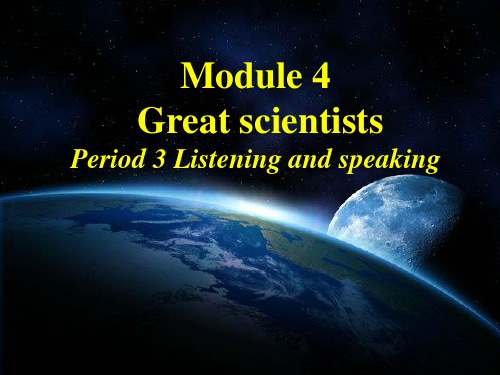
John Snow wanted to _f_a_c_e_the challenge and _s_o_l_v_e_this problem. He knew that cholera would
Thank you!
a: life experiences b: great contributions
and achievements
ห้องสมุดไป่ตู้
Listen for facts
Qian Xuesen was a _r_o_c_k_e_t _s_c_ie_n_t_is_t_. He first studied at university to be an _e_n_g_i_n_e_e_r_. Then he was lucky enough to go to _A__m_e_r_ic_a_ to study for his _d_o_c_to_r_’_s_ _d_eg_r_e_e_. It was then that he began to work on _r_o_ck_e_t_s_ there. There was no work on _s_p_a_c_e_ rockets in China before he began his institute to _d_e_s_ig_n__and _b_u_i_ld_ rockets to go into space.
Module 4 Great scientists
Period 3 Listening and speaking
John Snow was a _f_a_m__o_u_s_ doctor in London. He was so _e_x_p_e_r_t_ that
- 1、下载文档前请自行甄别文档内容的完整性,平台不提供额外的编辑、内容补充、找答案等附加服务。
- 2、"仅部分预览"的文档,不可在线预览部分如存在完整性等问题,可反馈申请退款(可完整预览的文档不适用该条件!)。
- 3、如文档侵犯您的权益,请联系客服反馈,我们会尽快为您处理(人工客服工作时间:9:00-18:30)。
Module 4 Great Scientists Section Ⅲ Grammar-复习被动语态和by+v语法图解探究发现①Rice is also grown in many other Asian countries.②Researchers were brought in from all over China to develop the new system.③The research was supported by the government.④In Pakistan rice will be grown in many parts of the country.⑤The new hybrid rice has been developed by the Yuan Longping Hightech Agricultural Company of China.⑥The shop closes at 6:00 pm every day.⑦The apple tastes good.⑧The new produ ct by the company sells well.⑨Open the door by winding the handle.⑩People usually greet each other by shaking hands.[我的发现](1)①句采用了一般现在时的被动语态,其构成形式为:am/is/are+done。
(2)②③句采用了一般过去时的被动语态,其构成形式为:was/were+done。
(3)④⑤句分别用了一般将来时和现在完成时的被动语态。
(4)⑥⑦⑧句中谓语动词以主动形式表示被动意义。
(5)⑨⑩句中,by+v.ing形式表示通过……方式。
一、被动语态被动语态表示主语为动作的承受者,只有及物动词才有被动语态,被动语态由“be+及物动词的过去分词”构成。
1.各种时态的被动语态的构成(1)一般现在时被动语态的构成:am/is/are+doneBefore you leave the lab,make sure the electricity is turned off and the windows are shut.在你离开实验室之前,要确保电源被切断,窗户被关好。
(2)一般过去时被动语态的构成:was/were+doneThe foreign guests were given a warm welcome by the children.孩子们热烈地欢迎外宾。
(3)一般将来时被动语态的构成:shall/will+be+doneMore space explorations will be made in the future by the Chinese people.中国人民在将来将进行更多的太空探索。
(4)现在进行时被动语态的构成:am/is/are+being+doneThey are living with their parents for the moment because their own house is being rebuilt.他们现在暂时和父母一起居住,因为他们自己的房子正在重建。
(5)过去进行时被动语态的构成:was/were+ being+doneAfter school we went to the readingroom to do some reading, only to be told that it was being decorated.放学后,我们去阅览室看书,结果却被告知阅览室正在装修。
(6)现在完成时被动语态的构成:has/have been+doneLi Hua has been elected monitor of our class to take the place of Ma Li.李华已取代马丽,被选为我班班长。
(7)过去完成时被动语态的构成:had been+doneWhen we got on the spot of the accident, we were told that the injured had been sent to the nearest hospital.当我们到达事故现场时,我们被告知伤员已经被送往最近的医院。
(8)将来完成时被动语态的构成:will/shall+have been+doneOn her next birthday, Ann will have been married for twenty years.到下一次过生日的时候,安结婚就要满二十年了。
(9)含有情态动词的被动语态的构成:情态动词+be+doneThe boy feels hot on the forehead, so he must be sent to hospital at once.这个男孩的额头摸起来发热,所以必须被立刻送往医院。
[即时演练1] 用所给词的被动语态填空①(2016·江苏高考改编)More efforts, as reported, will_be_made (make) in the years ahead to accelerate the supplyside structure reform.②(2015·北京高考改编)—Did you enjoy the party?—Yes,we were_treated (treat) well by our hosts.③(2015·天津高考改编)Despite the previous rounds of talks, no agreement has_been_reached (reach) so far by the two sides.④(2014·天津高考改编)We won't start the work until all the preparations have_been_made (make).⑤—Why don't we choose that road to save time?—The bridge to it is_being_repaired (repair).2.使用被动语态时应注意的情况(1)不及物动词或动词短语无被动语态(take place, break out, come true, belong to, date from, happen等)。
A fire broke out in his house yesterday.昨天他家着火了。
(2)含有介词或副词的及物动词短语变为被动语态时,介词或副词不可省略(look after, look for, take care of, put off, break into等)。
The children are taken good care of in the kindergarten.孩子们在幼儿园里被照顾得很好。
(3)带复合宾语(宾语+宾补)的动词变被动语态时,一般把复合结构中的宾语变成主语,而把宾语补足语(在被动语态中叫作主语补足语)放在动词之后。
We always keep the classroom clean and tidy.→The classroom is always kept clean and tidy by us.我们总是保持教室干净而且整洁。
[名师点津] see, watch, hear, notice, listen to, look at, make等感官动词或使役动词后作宾补的不定式不带to,但当主动语态变为被动语态时,不定式符号to必须加上。
A girl saw my wallet drop when she passed by.→My wallet was seen to drop by a girl when she passed by.一个姑娘路过时看到我的钱包掉了。
[即时演练2] 完成句子①The game takes_place every four years in a different country.这种活动每四年在不同的国家举行一次。
②Many interesting experiments are_carried_out in our laboratory.我们在实验室做了许多有趣的实验。
③He is_often_heard_to_play the guitar.我们经常听到他弹吉他。
④The old temple dates_from the Ming Dynasty.那座古庙起源于明朝。
3.主动形式表示被动意义的用法(1)某些连系动词,如look, sound, smell, feel, taste, prove等,可用主动形式表示被动意义,因为连系动词为不及物动词,它们没有被动语态形式。
That dog looks dangerous.那只狗看起来很危险。
(2)某些可用来表示主语内在“品质”或“性能”的及物动词,如:lock, shut, open, move, read, write, sell, wash, clean, catch, draw, cut,drink,eat等常用主动形式表示被动意义。
这些词后常有副词修饰,如well,easily等。
The cloth washes well and is comfortable to wear.这种布很容易洗而且穿起来很舒服。
(3)need, require, want, deserve等词,当主语为物时,接动名词的主动形式,表示被动意义,其含义相当于动词不定式的被动形式。
The flowers need watering or they will die.=The flowers need to be watered or they will die.这些花需要浇水,否则它们会死。
(4)形容词worth后面跟动名词的主动形式表示被动意义。
The picturebook is well worth reading.这本图画书很值得一读。
(5)在“主语+be+形容词(+for sb.)+to do”结构中,句子的主语与构成不定式的动词存在逻辑上的动宾关系,且形容词表示主语的特征或性质,不定式用主动形式表示被动意义。
常见的形容词有:easy, hard, difficult, important, interesting,strange,impossible,comfortable,dangerous等。
